After a solitary 5-mile run long before sunrise each morning, Pfc. Sabine Gonzalez grabs a cardboard container filled with scrambled eggs and hash browns in a suburban hotel lobby and heads back to her room.
She eats alone, adhering to a social distance that runs counter to the military culture she loves. She uses FaceTime to call her parents in nearby Lombard, telling them what she has seen and done since being activated by the Illinois National Guard to work at a coronavirus testing site on Chicago’s Northwest Side.
Gonzalez assures them that she is fine, that she will remain fine.
They all know the 18-year-old is making a promise she can’t necessarily keep.
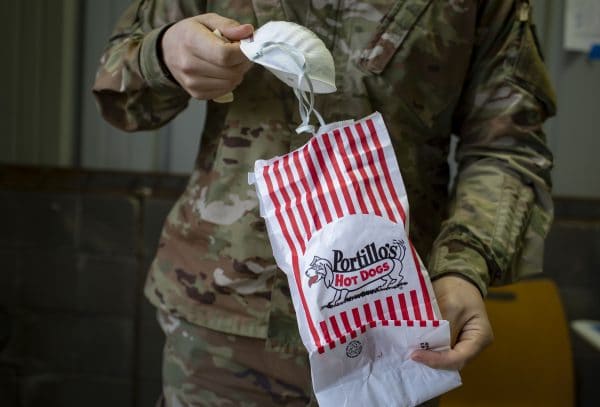
Members of the Illinois National Guard store their N95 face masks, which can be reused for several days, in Portillo’s bags as they suit up in personal protective gear Thursday, March 26, 2020 to begin shifts at their coronavirus testing facility on the Northwest Side. (Brian Cassella/Chicago Tribune/TNS)
A short time later, Gonzalez hikes a quarter-mile to a staging area in the Rivers Casino parking lot and begins preparing the trucks for departure. Morning formation has been canceled indefinitely during the outbreak to prevent the soldiers from lining up shoulder-to-shoulder.
The military convoy is soon on its way to an old vehicle emissions testing facility in the Dunning neighborhood, where the soldiers are fighting a war unlike any the Illinois National Guard has ever waged. Roughly 115 Guard members spent the past week testing first responders and health care workers for COVID-19, a service in such high demand that the site has reached its 250-patient daily limit within just a few hours each day.
“The whole thing is surreal,” said Gonzalez, a full-time student at the College of DuPage in Glen Ellyn. “I joined the National Guard so I could help wherever I was needed. I figured it would be in another state or somewhere I’ve never been. But this is my home, and I’m able to do something to directly help my friends and neighbors. It’s very special in that way.”
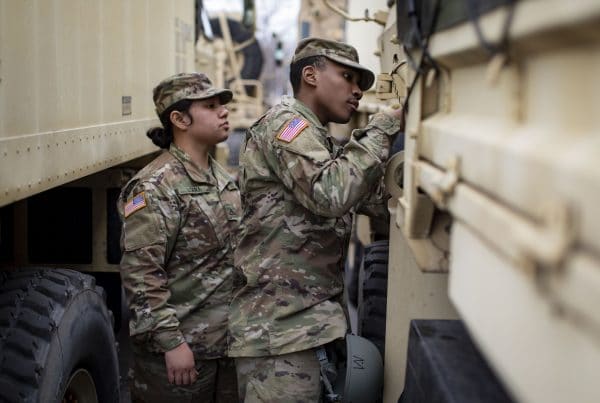
Illinois National Guard members Pfc. Isis Loera and Pfc. Isaiah Wallace do vehicle checks as their convoy arrives back at the Rivers Casino parking lot after completing a day of coronavirus testing Thursday, March 26, 2020. (Brian Cassella/Chicago Tribune/TNS)
It’s the first time the Illinois National Guard has been mobilized to primarily combat a medical issue. By necessity, much of the typical military protocol has been turned on its head. To keep the coronavirus at bay, the troops do not sleep near each other on cots, eat in large groups or spend much time together outside their shifts unless it’s necessary.
Instead, they bunker down in individual hotel rooms. Meetings are largely held via video conference, though participants are sometimes quartered just floors apart. Even the evening formation has been reduced to the soldiers and airmen checking in with their supervisors via text message.
“All missions are very different, but in this case, you’re fighting something invisible and it’s never really been done to this scale,” said Maj. Matt Schneider, a physician assistant and the mission’s chief medical officer. “It’s a brand-new thing for everyone.”
Gov. J.B. Pritzker has activated more than 240 Illinois Guard members in recent weeks, with most assigned to handle coronavirus testing. Though the Guard has called up doctors, nurses and medical technicians to help, the health care professionals are being excused from duty if their employers deem them essential to fighting COVID-19 in their civilian jobs.
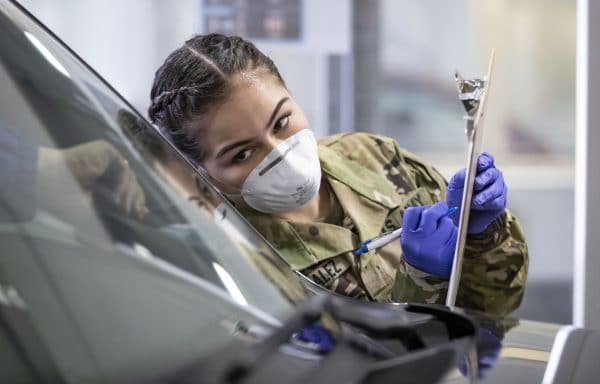
Pfc. Sabine Gonzalez, 18, of Lombard, verifies the identification and personal information of a first responder Thursday, March 26, 2020 at the Illinois National Guard coronavirus testing facility on the Northwest Side.(Brian Cassella/Chicago Tribune/TNS)
In most mobilizations, the 3625th Maintenance Co. from North Riverside and the Peoria-based 182nd Airlift Wing Medical Group play behind-the-scenes roles that draw little attention. In the time of the coronavirus, however, they represent the military’s proverbial tip of the spear and the need for their presence is evident.
When the convoy arrived at the testing last Thursday, cars already were lined up for blocks along West Forest Preserve Drive. The facility, a former vehicle emissions testing site the state closed in late 2016 to save money, did not open for another two hours. But the queue began, as it does most mornings, before dawn because this is the only spot within city limits dedicated to testing first responders and health care workers.
Before service members could enter the old emissions bays, they lined up outside a converted garage on an adjacent lot. With a vigilance that would make Mayor Lori Lightfoot proud, a sergeant barked out orders whenever the space between the troops appeared even the slightest bit less than 6 feet.
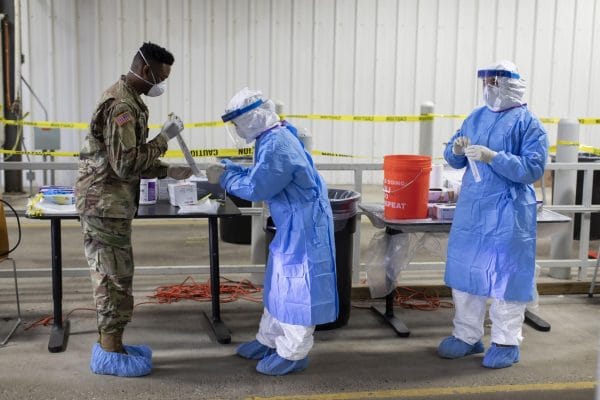
Spc. Latorris Thomas, Senior Airman Serena Nicholas and Airman first class Akira Tanton of the Illinois National Guard check patient names multiple times as they prepare to administer a coronavirus test to a first responder in a vehicle Thursday, March 26, 2020 on the Northwest Side. (Brian Cassella/Chicago Tribune/TNS)
Once inside, medical personnel took each soldier’s temperature and vital signs. It was the first of three such health checks conducted each day.
Anyone showing even the slightest sign of a fever is barred from interacting with the public. Some get sent back to the hotel and are placed in isolation until they are cleared, while those with less serious symptoms put on a mask indicating a health concern and keep their distance.
Under almost any other circumstance, Illinois Guard members would ignore the pain and get their jobs done. The war against the coronavirus, however, depends upon keeping as many people healthy as possible. The troops are under direct orders to be honest about their physical well-being and share even the mildest symptom.
“Normally, people in the military want to tough it out and push through it,” said Airman 1st Class Akira Tanton, an aerospace medical technician who conducts the nasal swab required for the test. “It’s hard, but at the same time you have to realize that if you’re sick you could compromise the whole mission.”
At exactly 9 a.m., the bay doors rolled open and testing began. At the front of the line, an Illinois Department of Health worker took the temporal temperature of each driver and eligible passenger, then scribbled the results on the car door window. At the week’s start, the site accepted anyone who worked in an eligible field, but on Friday the state restricted its testing to first responders and health care workers with underlying symptoms and fevers of 100.4 or greater.
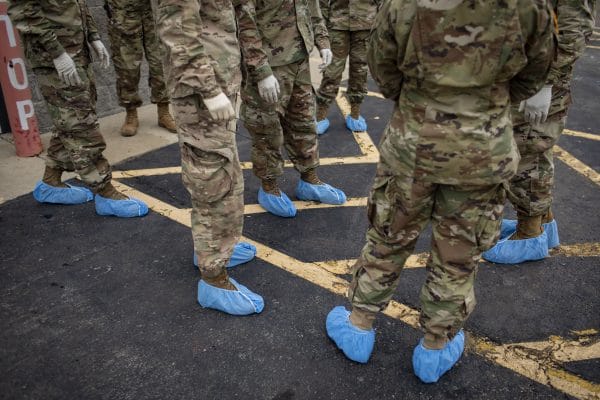
Members of the Illinois National Guard suit up in personal protective gear Thursday, March 26, 2020 to begin shifts at their coronavirus testing facility on the Northwest Side. (Brian Cassella/Chicago Tribune/TNS)
People older than 60 and those with underlying medical conditions also now qualify for testing at the site, though they must have a fever and other symptoms.
With just two days to become operational, the system runs as if it’s part vehicle emissions test, part Portillo’s drive-thru. As cars line up in orderly rows and await their turn to enter the bay, soldiers hasten the process by approaching drivers before they reach the front to handle the administrative paperwork.
Some drivers look clearly ill, coughing and sneezing as they pull up. Pfc. Gonzalez, who fills out the medical forms for patients, stands a safe distance away and orders drivers to crack their windows only a few inches when answering her questions.
Wearing gloves, an N95 mask and boot covers, she has them place their driver’s license on the dashboard and roll up their windows as she copies down their full name and address. The paperwork is verified at least three times before the patient receives the test.
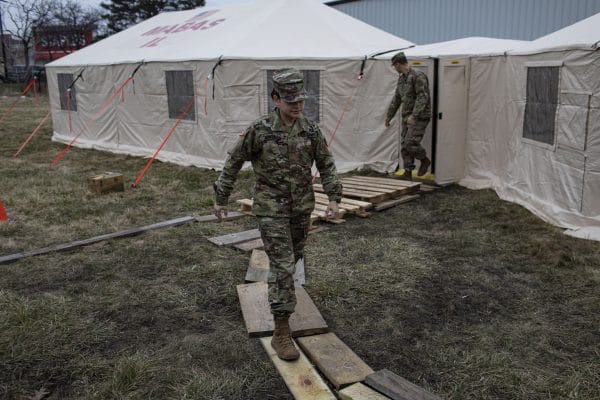
Pfc. Sabine Gonzalez, 18, of Lombard, prepares for her shift as Illinois National Guard members arrive Thursday, March 26, 2020 at their coronavirus testing test on the Northwest Side. (Brian Cassella/Chicago Tribune/TNS)
When drivers reach the swabbing area, an Illinois National Guard member approaches wearing a white coverall, surgical smock, hood, face shield, two pairs of gloves, boot covers and a mask. Airman Tanton tries to comfort the patients, telling them the procedure is a quick one and most people find it far easier than they feared.
Last Thursday, one woman cried and clutched a rosary as Tanton inserted the swab deep into the nasal cavity and counted the requisite 10 seconds. The airman pulled out the swab and handed it to her partner, who sealed it in a medical bag and then passed it to another soldier who brought it across the room for refrigerated storage.
With all the various safety procedures and verification points, the process took about five minutes once cars enter the bay. The swab portion lasted as little as 35 seconds between the time Tanton offered her reassuring introduction and the drivers restarted their cars to exit.
The snaking car lines and hourlong wait reflect the overwhelming demand far more than the service members’ execution. Their assembly-line approach is in constant motion, as the troops use two of the facility’s bays for testing. A third bay is used as a decontamination area, while the other lanes remain open so traffic can be diverted if cars break down or batteries die inside the building, as at least three already have done.
The results take up to seven days to come back, Illinois National Guard spokesman Maj. A.J. Ruggieri said.
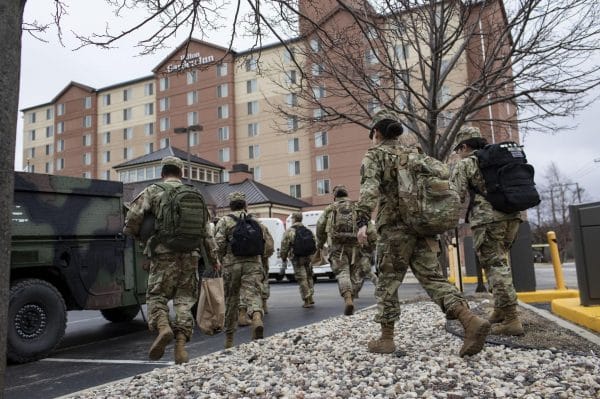
Members of Illinois National Guard walk back to their hotel from their convoy parking in the Rivers Casino parking lot after completing a day of coronavirus testing Thursday, March 26, 2020. (Brian Cassella/Chicago Tribune/TNS)
The troops averaged more than 60 tests an hour last Thursday, with the lines moving faster each day. Guard members stop as soon as they use 250 kits, the maximum number of the swabs permitted by the federal government, according to state officials.
On Saturday, the Guard also helped open a testing site in Bloomington in central Illinois. Testing there also tops out at 250 kits each day.
Pritzker has called on the federal government to ease its restrictions so more tests could be done.
“We are turning people away when we just shouldn’t have to,” the governor said Sunday.
Once the Chicago site hits its daily quota, Guard members go through a decontamination process and have their temperatures taken a final time. In a sign that this mission is a quintessential Chicago one, the troops leave carrying their N95 masks — which many will reuse the following day — in red-and-white-striped Portillos bags donated by the restaurant.
Back at the hotel, there is more work to be done as the troops tackle both their military and personal responsibilities.
Maj. Schneider continues reading the latest virus-related studies and listening to podcasts by respected scientists until late into the evening.
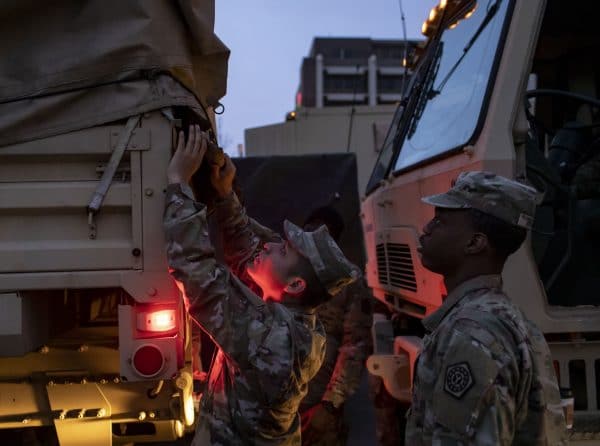
Spc. Felipe Sosa (center) and other members of the Illinois National Guard perform vehicle checks on their convoy before sunrise Thursday, March 26, 2020 in the parking lot of Rivers Casino to begin the day’s work. The Guard is running a coronavirus testing facility open to first responders on the Northwest Side. (Brian Cassella/Chicago Tribune/TNS)
He also takes time to FaceTime with his wife, Kayleigh, and two small children back in suburban Plainfield. As a full-time Illinois National Guard member, he is used to deployments that send him away from home. This is the first time, however, that he has served during a crisis that also affected his family.
He knows the burden to keep the family healthy has fallen almost entirely on his wife’s shoulders, so to show his appreciation, he sends text messages throughout the day and little gifts via Amazon.
“I dissociate from it a little bit so that I can focus on what’s going on here. I think we all try to do that,” he said. “You rely on your spouse to be a rock at home … and my wife is a rock.”
Tanton also regularly calls her family in Sterling, about two hours west of Chicago, to talk about her day and encourage them to stay at home if possible. A sophomore at the University of Illinois at Chicago, she has become an unabashed advocate for social distancing and adhering to guidelines established by the Centers for Disease Control and Prevention.
When Tanton sees friends posting group photos as if the governor’s stay-at-home order is simply extended spring break fun, she chastises them first and then lays on the guilt if necessary.
“How much people pay attention to those social distancing protocols is how long this is going to last,” she said she tells them. “So, if they follow the protocols, then we can get control of this faster and I can come home faster.”
Like many Guard members, Tanton goes for a solo run outside each day, enjoying one of the few permissible ways the troops are allowed to leave the hotel. Dinner is typically a boxed meal picked up in the lobby, though some fend for themselves and use Grubhub.
Both Tanton and Gonzalez devote time each day to college studies. Though they say their professors have been supportive during their deployment, the women want to keep pace with their classes as much as possible. It helps that Illinois college campuses have closed and professors have turned to remote learning.
Within 15 minutes of returning to the hotel last week, Gonzalez put on camouflage-patterned yoga pants and a hoodie before starting her sociology homework. Just a week before, she had been a college student watching “The Office” on Netflix when her sergeant called to say she had been activated and ordered Gonzalez to report to her unit the following morning.
She’s still a college student — but one tasked with helping fight an unprecedented battle.
“I was worried they wouldn’t activate me because I was in school,” she said. “But I really wanted to be here. Someday, I will tell my children about this and how I answered the call.”
___
© 2020 Chicago Tribune
Distributed by Tribune Content Agency, LLC.



